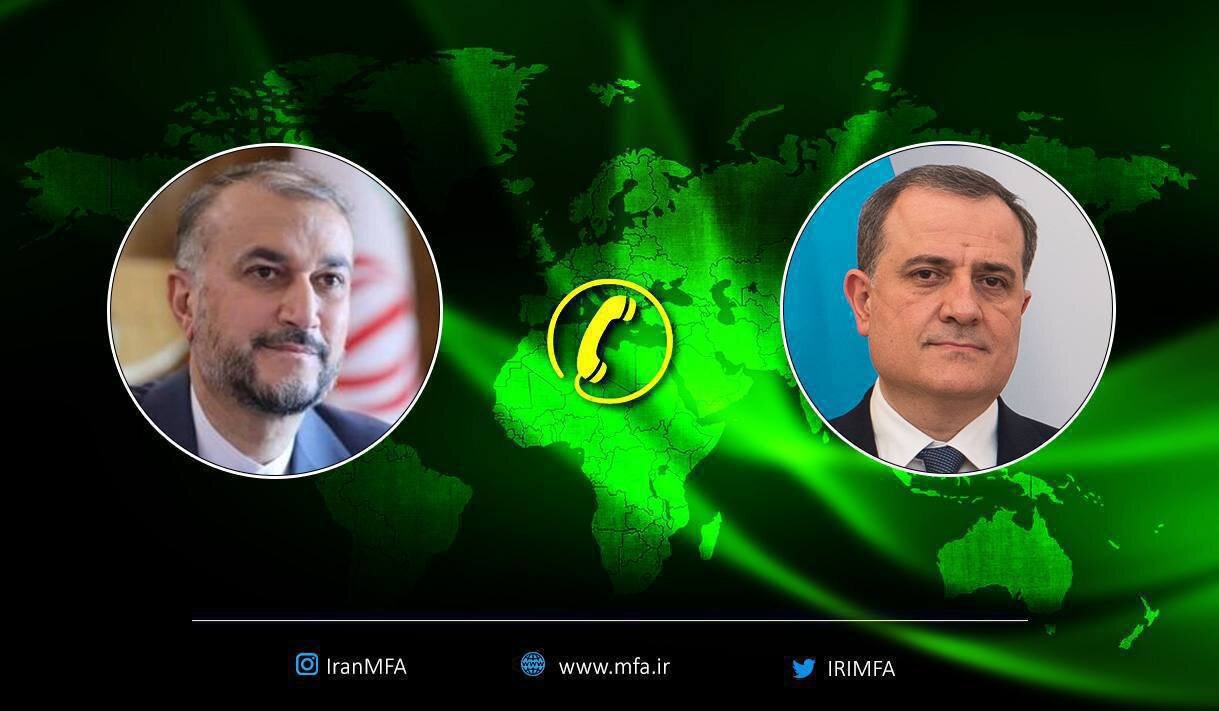Tehran, Baku moving toward productive manner, Amir Abdollahian says

TEHRAN- Iran and the Republic of Azerbaijan are now on a favorable road of constructive collaboration, Iranian Foreign Minister Hossein Amir Abdollahian said on Thursday after he spoke on phone with his Azeri counterpart Jeyhun Bayramov.
Discussing with Bayramov the most significant issues affecting bilateral relationship and the region, Amir Abdollahian said that the collaboration process between Tehran and Baku is now moving along in a positive and productive manner.
Additionally, he characterized as a success the recent meeting between Iranian and Azeri delegates under the framework of the joint intergovernmental economic commission.
Based on Amir Abdollahian, the two parties secured good agreements on rail and road routes at the joint commission meeting, which took place on July 17 in the Iranian border city of Astara.
Iran’s top diplomat once more denounced the recent terrible acts of desecration of the holy Quran in Sweden and Denmark, making reference to a virtual meeting of the Organization of Islamic Cooperation due to take place on Monday.
Bayramov, for his part, praised Amir Abdollahian’s recent visit to Baku, stating that “we can see its positive effects” on the two nations’ ties in the shortest time possible.
Azerbaijan’s top diplomat also expressed gratitude to Tehran for its positive attitude toward the Karabakh region.
Karabakh, internationally recognized as part of Azerbaijan, has been the source of the enmity between the two countries since the 1990s, when Azerbaijanis left their homes after the first conflict broke out.
The second Karabakh war broke out in 2020, killing about 6,500 people on both sides during the course of a six-week struggle.
The conflict concluded with a Russian-brokered agreement in which Yerevan ceded large swaths of Azerbaijani land that it had held for over three decades.
Bayramov also reviewed the latest situation of talks between Baku and Yerevan over the disputed area, as well as the Lachin corridor, a major mountain road that connects Armenia and Karabakh via Azerbaijani territory.
Both Amir Abdollahian and Bayramov emphasized that foreigners’ meddling in the region is destructive, underlining the need for regional countries to address regional concerns.
Iran asks Denmark to stop more sacrilegious acts
Also, in a phone conversation with his Danish counterpart on Wednesday, Amir Abdollahian urged Denmark to take decisive action to prosecute individuals responsible for recent desecrations of the Muslim holy book there and to stop a recurrence of such blasphemous actions.
Extremist groups have desecrated the holy Quran during the past month in separate occurrences in Sweden and Denmark under the support of police.
The blasphemous actions have infuriated the whole Muslim world, leading to the summoning or expulsion of Swedish and Danish envoys from a number of Muslim nations.
Amir Abdollahian also noted that the recent insults have harmed the feelings of Muslims and adherents of other Abrahamic religions, suggesting they must be stopped.
“Freedom of expression is not a concept that can be used to justify targeting and attacking religious values,” the Iranian foreign minister said, noting the repetition of such “reprehensible and insulting actions,” which are reminiscent of the time before the advent of Islam, are “condemned in the strongest possible terms.”
He went on to add, “As to the repetition of the abhorrent phenomenon of insulting the holy Quran the Danish government is seriously expected to prevent the recurrence of such acts through responsible actions and effective measures and to hold the perpetrators accountable with the harshest punishment.”
For his part, Danish Foreign Minister Lars Looke Rasmussen expressed sadness for the offense and stated that Denmark vehemently condemns the desecration of the Quran.
He recognized freedom of expression and religion, as well as peaceful protests, as the key cornerstones of the Danish constitution, but expressed sorrow that some individuals misuse these, “which we consider unacceptable.”
“These few individuals should not be considered representatives of the Danish people,” he underlined.
